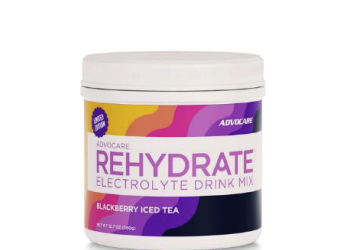
Let’s face it, we all experience days when we’re feeling a little bit sluggish. It could be due to packed family schedules, travel, work – pretty much anything. And, when you’re feeling tired, it makes accomplishing anything feel like an uphill climb. Next time you’re feeling low on energy, here are some practical tips that may help put some pep back into your step!
Go for a walk
Doing something active may seem counterintuitive if you’re feeling tired. However, a quick walk can do wonders! Light activity increases circulation throughout the body, which means increased blood flow to your brain, making you feel more alert. There’s also some evidence that suggests that exercise, such as walking, has a positive impact on brain neurotransmitters, which can also help you feel more energized.1
Take a power nap
Naps are not just for little kids. In fact, a 10-20 minute nap may be all you need! This time period can help provide your body with enough sleep to feel more rested, but not so long that you fall into the deepest stage of sleep – which can leave you feeling groggy.2
To learn more about optimizing your nap time, make sure to read our article The Power in Power Naps.
Manage Stress
Being stressed takes up a lot of physical and mental energy. Chronic stress is even associated with an increased risk for insomnia.3 While we may not be able to get rid of all the stress in our lives, there are some strategies that can help keep it under control. Healthy ways to help manage stress can include things like meditation, exercise and eating a well-balanced diet. Try to also take some time each day to participate in activities that bring you joy.4
For more tips on managing stress, read Stress Management.
Stay Hydrated
One of the first symptoms of dehydration is fatigue. Without adequate fluids, it becomes difficult for your body to carry out essential functions. Drinking enough water can help ensure your muscles are receiving the nutrients that they need, which in turn can help you feel more energized.5 Adding an electrolyte replacement, such as AdvoCare Rehydrate®, can also be a great strategy to help maintain proper hydration.
To learn more about hydration, check out Hydration: Is Water Enough?
Caffeinate
Caffeine is a natural stimulant that helps increase energy levels. To help reap the benefits of caffeine, however, there are some important things to keep in mind. Try to avoid consuming high sugar, high calorie coffee drinks, which could be counterproductive in the long run.6 I think it would be beneficial to add a line to the effect of “Just as you monitor the calories in foods you eat be mindful of the caffeine content in products you consume.”
Also, it’s best to stop drinking caffeine around 6 hours before you go to bed, otherwise it may interfere with your sleep.7
If you’re looking for a sugar-free caffeine boost, with the added benefit of vitamins and minerals, click here to learn more about Spark®.
Snack Smartly
We often crave sugary snacks when we’re tired, but beware that giving into these cravings can leave you feeling even more tired. That’s because high sugar foods have a high glycemic index, meaning they have a high volume of readily available sugars. Initially, those sugars circulate through your bloodstream increasing your energy levels. However, as your body produces more insulin, the levels of sugar in your bloodstream will quickly decrease, leaving you feeling fatigued and tired. To avoid this pitfall, try to seek out foods that have a lower glycemic index. This typically includes foods that are less processed, high in fiber and low in sugar.8
Sources:
1 5 reasons walking is better than coffee for an energy boost. MyFitnessPal Blog. (2022, May 5). Retrieved June 8, 2022, from https://blog.myfitnesspal.com/5-reasons-walking-is-better-than-coffee-for-an-energy-boost/
2 Napping: Health Benefits & Tips for your best nap. Sleep Foundation. (2022, January 20). Retrieved February 24, 2022, from https://www.sleepfoundation.org/sleep-hygiene/napping
3 Link, R. (2021, December 14). Stress symptoms: Physical effects of stress and how to treat. Healthline. Retrieved June 8, 2022, from https://www.healthline.com/nutrition/symptoms-of-stress
4 Centers for Disease Control and Prevention. (2021, November 30). Tips for coping with stress. Centers for Disease Control and Prevention. Retrieved June 8, 2022, from https://www.cdc.gov/violenceprevention/about/copingwith-stresstips.html?CDC_AA_refVal=https%3A%2F%2Fwww.cdc.gov%2Fviolenceprevention%2Fpublichealthissue%2Fcopingwith-stresstips.html
5 NBCUniversal News Group. (n.d.). Do you really need to drink 8 glasses of water a day? NBCNews.com. Retrieved June 8, 2022, from https://www.nbcnews.com/better/diet-fitness/down-low-h20-n760721
6 Stop! is your coffee a calorie bomb?: Nutrition: Myfitnesspal. MyFitnessPal Blog. (2017, April 26). Retrieved June 8, 2022, from https://blog.myfitnesspal.com/stop-coffee-calorie-bomb/
7 Caffeine’s connection to sleep problems. Sleep Foundation. (2022, May 6). Retrieved June 8, 2022, from https://www.sleepfoundation.org/nutrition/caffeine-and-sleep#:~:text=The%20recommended%20cut%2Doff%20time,can%20help%20minimize%20sleep%20problems.
8 Keep your weight down and your energy up with the glycemic index. Harvard Health. (2014, November 13). Retrieved June 8, 2022, from https://www.health.harvard.edu/staying-healthy/keep-your-weight-down-and-your-energy-up-with-the-glycemic-index





